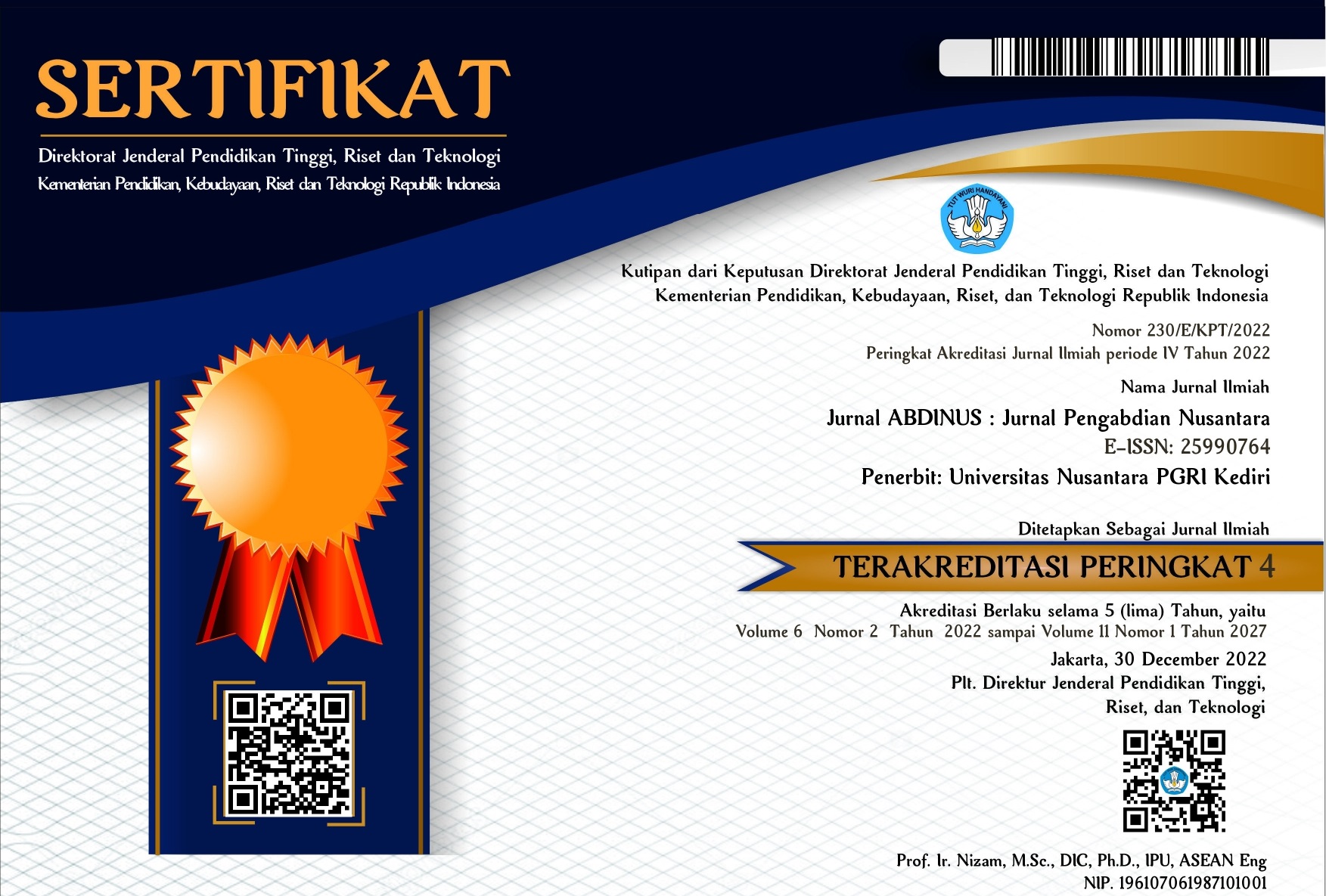Implementasi Biology Club I di SMA Karitas Watuneso, Kecamatan Lio Timur, Kabupaten Ende
DOI:
https://doi.org/10.29407/ja.v4i2.15286Keywords:
biologyclub, games, high school, watunesoAbstract
Biology learning is defined as material that is difficult to experience biological concepts. The biology learning offered must have a role as something easy to implement. The collaboration of games and biology is one of the concepts to introduce biology that plays a game. Therefore, my Biology Club Team took the initiative to provide experiences and emphasize the deep character of biology to motivate students. This research aims to integrate biology material and games at Karitas Watuneso High School in Biology Club I activities. We collaborated direct instruction, demonstration, and discussion methods. The implementation of Biology Club I at Karitas Watuneso High School received a positive response with the highest level of satisfaction starting from the Zoology Games, Botany Games, and Microbiology Games. The level of significance of Biology Club I received the highest score, followed by material understanding and activity satisfaction.
Downloads
References
Bhaskar, A. (2014). Playing games during a lecture hour: Experience with an online blood grouping game. Advances in Physiology Education, 38(3), 277–278. https://doi.org/10.1152/advan.00006.2014
Carew, M. (2018). Using a word game to test physiology comprehension. Advances in Physiology Education, 42(3), 464–465. https://doi.org/10.1152/advan.00058.2018
Gutierrez, A. F. (2014). Development and Effectiveness of an Educational Card Game as Supplementary Material in Understanding Selected Topics in Biology. CBE—Life Sciences Education, 13(1), 76–82. https://doi.org/10.1187/cbe.13-05-0093
Jayawardana, H. B. A. (2017). Paradigma Pembelajaran Biologi di Era Digital. Jurnal Bioedutika, 5(1), 12. https://doi.org/10.26555/bioedukatika.v5i1.5628
Ningrum, G. D. K. (2018). Studi Penerapan Media Kuis Interaktif Berbasis Game Edukasi Kahoot! Terhadap Hasil Belajar Mahasiswa. V O X E D U K A S I Jurnal Ilmiah Pendidikan, 9(1), 10. https://doi.org/10.31932/ve.v9i1.32
Ningrum, M. A., Maulidiyah, E. C., & Khatimah, N. (2020). Pelatihan Pembuatan Fun Games bagi Guru PAUD di Kabupaten Jombang Jawa Timur. Jurnal Pengabdian Kepada Masyarakat, 5(3), 724–731. https://doi.org/10.30653/002.202053.333
Osier, M. V. (2014). A Board Game for Undergraduate Genetics Vocabulary and Concept Review: The Pathway Shuffle †. Journal of Microbiology & Biology Education, 15(2), 328–329. https://doi.org/10.1128/jmbe.v15i2.794
S, M., & Bare, Y. (2019). Meningkatkan Hasil Belajar Siswa pada Konsep Perubahan dan Pelestarian Lingkungan Hidup dengan Model Discovery Learning di SMAS Katolik ST Gabriel Maumere. BIOEDUSCIENCE: Jurnal Pendidikan Biologi dan Sains, 3(2), 84–89. https://doi.org/10.29405/j.bes/3284-893298
Sekolah Kita. (2020). SMA KARITAS. http://sekolah.data.kemdikbud.go.id/index.php/chome/profil/a6b05ea1-6d10-4dfb-b038-fe49525be50e
Selvi, M., & Öztürk Çoşan, A. (2018). The Effect of Using Educational Games in Teaching Kingdoms of Living Things. Universal Journal of Educational Research, 6(9), 2019–2028. https://doi.org/10.13189/ujer.2018.060921
Suryanu, Pribadi, T. A., & Rudyatmi, E. (2014). Pengaruh Experiential Learning Kolb Melalui Kegiatan Praktikum Terhadap Hasil Belajar Biologi Siswa. Unnes Journal of Biology Education, 3(2), 20–228.
Wati, L., S, N. H. A. R., & Rodja, M. M. (2020). Peran Guru dalam Pembentukan Karakter Peserta Didik di SMA Karitas Watuneso. EDUCATION: Economic and Education Journal, 2(2), 112–119. https://doi.org/10.33503/ecoducation.v2i2.844















